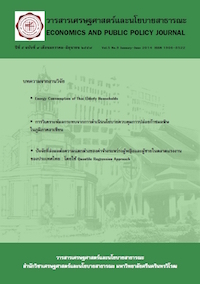ปัจจัยที่ส่งผลต่อความแตกต่างของค่าจ้างระหว่างผู้หญิงและผู้ชายในตลาดแรงงานของประเทศไทย
Main Article Content
บทคัดย่อ
บทความนี้ได้ศึกษาเกี่ยวกับปัจจัยที่ส่งผลต่อความแตกต่างของค่าจ้างระหว่างผู้หญิงและผู้ชายในตลาดแรงงานไทย มีวัตถุประสงค์ในการศึกษา 2 ข้อ ประกอบด้วย 1) ศึกษาปัจจัยที่ส่งผลต่อค่าจ้างของแรงงานหญิงและชาย โดยใช้แนวคิด Quantile Regression และ 2) วิเคราะห์องค์ประกอบความแตกต่างของแรงงานหญิงและชาย โดยใช้แนวคิด Oaxaca-Blinder Decomposition การศึกษาครั้งนี้ได้ใช้ข้อมูลการสำรวจแรงงานปี 2556 ไตรมาสที่ 3 ในการวิเคราะห์ ผลการศึกษาพบว่าประสบการณ์ การศึกษา สถานภาพของแรงงาน ชั่วโมงการทำงาน และขนาดของกิจการ มีความสัมพันธ์ต่อค่าจ้างของแรงงาน จากนั้นได้เมื่อแยกองค์ประกอบความแตกต่างระหว่างค่าจ้างระหว่างผู้หญิงและผู้ชาย พบว่า ในกลุ่มของแรงงานที่มีค่าจ้างสูง ความแตกต่างของปัจจัยด้านการศึกษา และ ขนาดของกิจการ ส่งผลให้ผู้หญิงสามารถสร้างความได้เปรียบเรื่องอัตราค่าจ้างเมื่อเปรียบเทียบกับแรงงานชาย แต่ปัญหาการเลือกปฏิบัติทางเพศนั้นก็ยังคงเป็นปัญหาของกลุ่มของแรงงานหญิงที่มีค่าจ้างสูงในตลาดแรงงานของไทย
Affecting Factors of Wage Differentials between Female and Male in Thailand Labor Market
This paper studies the factors affecting the wage differentials between the female and male labor in Thailand market. There are two main objectives consist of firstly, studying the factors effecting female and male workers by using Quantile Regression and secondly, analysing the combination of wage differentials between female and male by using Oaxaca-Blinder Decomposition procedure. This study has applied the data which were obtained from the Labor Force Survey, Quarter 3th. The findings found that Experience, Education, Status of Labor, Work Hour and Firm Size were the factors related with wage of labor. The decomposition of wage differentials between female and male has found that the high wage group has the differentials factors which are Education and Firm Size. As a result, if compared with between female and male, female have the advantage over male of the high wage level. However, gender discrimination persists at the high-wage level, which results in the glass ceiling effect in the Thailand labor market.
Article Details
สงวนลิขสิทธิ์ © 2553 คณะเศรษฐศาสตร์ มหาวิทยาลัยศรีนครินทรวิโรฒ
คณะเศรษฐศาสตร์ มหาวิทยาลัยศรีนครินทรวิโรฒ จัดพิมพ์วารสารเศรษฐศาสตร์และนโยบายสาธารณะ เพื่อเผยแพร่บทความวิชาการทางเศรษฐศาสตร์ นโยบายสารธารณะ และสาขาอื่นๆที่เกี่ยวข้อง ทัศนะและข้อคิดเห็นใดๆ ที่ปรากฏในวารสารเป็นความคิดเห็นส่วนตัวของผู้เขียน โดยบทความที่ได้รับการตอบรับจะถือเป็นลิขสิทธิ์ของคณะเศรษฐศาสตร์ มหาวิทยาลัยศรีนครินทรวิโรฒ
บรรณาธิการ อาจารย์ ดร.พลพัธน์ โคตรจรัส


